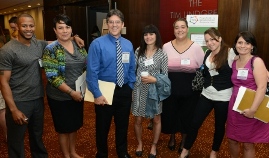You are here
As the association growing and training the recovery workforce, PRA is the premier source of learning, knowledge and research for the psychiatric rehabilitation profession, providing resources, education, ideas and advocacy to enhance power and performance. PRA represents more than 1,300 individual and organizational members, representing 8,000 psychiatric rehabilitation professionals.
 The diverse membership of PRA includes agencies, practitioners, families, and persons living with psychiatric disabilities, leaders in psychiatric rehabilitation education and research from major universities across the United States and the world, as well as state and federal government entities dedicated to improving outcomes in a cost-effective, evidenced-based, and highly successful model.
The diverse membership of PRA includes agencies, practitioners, families, and persons living with psychiatric disabilities, leaders in psychiatric rehabilitation education and research from major universities across the United States and the world, as well as state and federal government entities dedicated to improving outcomes in a cost-effective, evidenced-based, and highly successful model.
We believe the psychiatric rehabilitation community has the power to transform society for the better. Our passion is to help the recovery workforce achieve previously unimaginable levels of performance. We are dedicated to providing access, advocacy and strategies to implement state-of-the-art psychiatric rehabilitation and recovery-oriented practices through education and professional credentials, research, service outcomes and networking.
Our Commitment to Diversity
Diversity makes organizations more successful and communities more fulfilling. By actively cultivating a diverse community of professionals, we benefit from a vastly richer mix of ideas, perspectives and experiences that expands our possibilities. PRA is committed to building diversity of all kinds - on our staff, in our membership, and within the profession at large.
PRA recognizes the striking disparities in mental health care found for racial and ethnic minorities. A culture-centered approach to recovery recognizes and understands that both the philosophy and practice of mental health services, and the contemporary theories and practices of psychiatric rehabilitation, medicine, psychology, social work, nursing, and other disciplines in the healing arts, are derived from a specific Eurocentric cultural context. A culture-centered approach is integral to psychiatric rehabilitation and must be based on the cultural context of the individual person who is using PSR services.
Read our PRA Multicultural Principles and the background on the creation of the Multicultural Principles.



